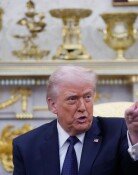S. Korea should demonstrate its diplomatic power
S. Korea should demonstrate its diplomatic power
Posted June. 10, 2019 07:39,
Updated June. 10, 2019 07:39
Almost a year has passed since U.S. President Donald Trump and North Korean leader Kim Jong Un had their first historic meeting in Singapore on June 12 last year, but no progress has made on the denuclearization front and the nuclear talks are stuck in a deadlock. This is because the joint statement at the Singapore summit included only a vague commitment to a “complete denuclearization of the Korean peninsula,” lacking substance like a concept or specific steps to achieve the goal. Starting from the inter-Korean summit on April 27 last year, South Korea and the United States had focused on a meeting with Kim itself, rather than what would be discussed and produced through a meeting.
A fundamental reason behind the roller-coaster like relationship between Washington and Pyongyang last year is because it is unclear whether Kim Jong Un is committed to getting rid of nuclear weapons. The Trump administration has been maintained its stance of keeping sanctions in place until the North denuclearizes, but has also opened the door for dialogue. North Korea, though it recently test-launched missiles to escalate tensions, also seems to be seeking to break the stalemate. Facing the presidential election scheduled for November next year, Trump may feel too pressured to put up with uncertainties surrounding the North’s nuclear issue and try to resume dialogue.
This could signify a possibility that the Moon administration will be required, yet again, to play the role of a mediator. Mediating between the two sides is vital in itself, but more importantly, what Seoul does should be able to change Kim’s attitude toward denuclearization. The South Korean government has recently decided to send 8 million dollars’ worth of aid to the North through the World Food Program (WFP) and the United Nations Children’s Fund (UNICEF), and allowed businesses in the currently closed Kaesong Industrial Complex to visit the region to check up on properties. Such moves are aimed at resuming nuclear talks, but Pyongyang appears to be indifferent. They are apparently turning away from Seoul, while getting closer to Beijing and Moscow.
Still, the Moon Jae-in administration has been only focused on ingratiating itself with North Korea, paying nearly no attention to diplomacy with the four powers, which is needed to respond to rapidly changing circumstances in the region. However, the Kim Jong Un regime would respond when Seoul demonstrates its diplomatic power with or against Washington and Tokyo. For the nuclear talks to move forward, it is necessary to win the support and agreement of neighboring countries. The South Korean government should face the reality squarely to get through raging waves of diplomacy.







